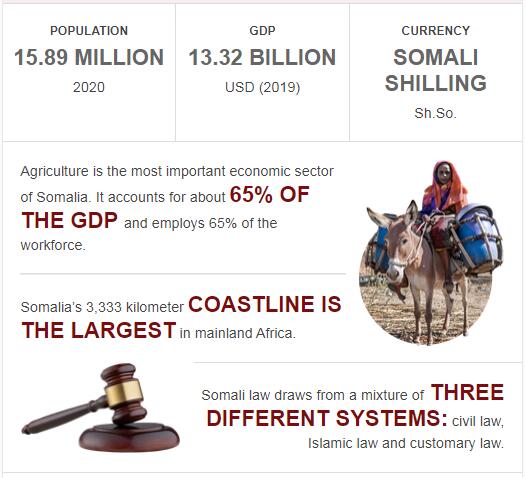Somalia is a nation located on the Horn of Africa, bordered by Ethiopia, Djibouti and Kenya. The population of Somalia is around 15 million people. The economy of Somalia is largely dependent on livestock, remittances and telecommunications, with its GDP per capita estimated at US$500 in 2017. In terms of foreign relations, Somalia has strong ties to other countries in the region as well as other countries around the world. It is also a member of the United Nations, African Union (AU) and Arab League. In terms of politics, Somalia has a federal parliamentary republic which includes several major parties: Somali National Alliance (SNA), Somali People’s Democratic Party (SPDP) and Somali Patriotic Movement (SPM). The Parliament consists of 275 members who are elected by popular vote every four years. In 2017, Mohamed Abdullahi Farmaajo was president and his SNA party held majority in parliamentary elections. See militarynous for Somalia military and defense.
Yearbook 2017
Somalia. In February, a new president was elected by a vote in Parliament. According to Countryaah.com, a total of 24 candidates, most of them former ministers or people who returned from exile. The election itself was held at Mogadishu Airport. In the first round, incumbent President Hassan Sheikh Mohamud received the most votes. In the second, he was put against Mohamed Abdullahi Mohamed, who was Prime Minister 2010-11. Somewhat unexpectedly, the latter received 184 votes against 97 in the second round. Actually, two-thirds of the vote is required to be elected president, but the challenger was declared victorious after Hassan Sheikh Mohamud acknowledged being defeated. The new president had lived in the United States for several years and is called “Farmajo”, a nickname that comes from the Italian word for cheese, formaggio, and which he learns to have received because his father must have liked cheese a lot. Hassan Ali Kheyre was appointed new Prime Minister, who has both Norwegian and Somali citizenship and who was the head of the British oil company Soma Oil & Gas. See ABBREVIATIONFINDER for frequently used acronyms and abbreviations related to as well as country profile of Somalia.
At the end of February, President Mohamed announced a state of disaster throughout the country. Somalia was plagued by drought and, according to the World Health Organization, the country was at risk of starvation for the third time in 25 years. The President therefore appealed for help from the outside world.
In November, presidential elections were held in the outbreak republic of Somaliland. Three candidates participated in the election, which was postponed several times. Winning was Musa Bihi Abdi from the Peace, Unity and Development Party (Kulmiye), who received 55% of the vote against 41% for Abdirahman Mohamed Abdullahi (known as “Irro”), representing the Waddani Party. Abdi succeeded his party mate Ahmed Mohamed Silaanyo as head of state. In the violent protests that followed the election and “Irros” allegations of irregularities, at least eleven people were killed.
The security situation remained unstable during the year. In May, the first attack in Somalia was carried out by the Islamic State (IS). Five people were killed in a suicide attack in the Puntland region. In November, a UN report was published describing how a faction of IS has established itself in Puntland, where several attacks have been carried out. The center of the group was the city of Qandala in the Bari region, which was feared to be a sanctuary for IS fighters fleeing Syria and Iraq.
The Somali terrorist group al-Shabab also continued to be a serious threat. In October, at least 358 people were killed and over 100 injured when two bomb attacks were carried out in the central parts of Mogadishu. A few days later, thousands of people in the capital protested against al-Shabab. At the end of the month, a hotel popular with government officials was attacked with two car bombs and five armed men stormed the building. The attack cost at least 27 people their lives. Unlike the bombings in the middle of the month, al-Shabab took on the latter action but the movement was suspected of both deaths.
During the year, the United States conducted several attacks on suspected terrorists, partly with drones, and with a November air strike against an al-Shaba camp northwest of Mogadishu, when more than 100 militiamen were killed.

Country data
Area: 637,657 km2 (world rank: 41)
Residents: 14,743,000
Population density: 23 per km2 (as of 2017, world rank: 74)
Capital: Muqdisho (Mogadishu)
Official languages: Somali
Gross domestic product: 7.4 billion US $
gross national product (GNP, per resident and year) N/ A
Currency: Somaliland Shilling
Embassy
Potsdamer Str. 144,10783 Berlin
Telephone 030 23630010,
Fax 030 23630011
E-Mail: somaliembassyberlin@gmail.com
Government
Head of State: Mohamed Abdullahi “Farmajo” Mohamed, Head of Government: Hassan Ali Khaire, Outside: Ahmed Isse
National Day: 1.7.
Administrative structure
6 federal states
State and form of government
Provisional constitution of 2012
Federal Republic
State religion: Islam
Islamic law (Sharia)
Parliament: House of the People with 275 appointed members; Upper House with 54 appointed members.
Election of the head of state by the parliament every 4 years.
Suffrage from 18 years.
Population of: Somalis
last count 1987: 7,114,431 residents
approx. 95% Somal tribes (Isaaq, Absami, Habargidir, Abgal, Darod, Digil, Issa, Hawiye and others)
Cities (with population): Hargeysa as of 2014: 741,000 residents.
Religions: 99.8% Muslim (Sunnis Shafiite) (as of 2006)
Languages: Somali; Languages of the ethnic groups, Arabic